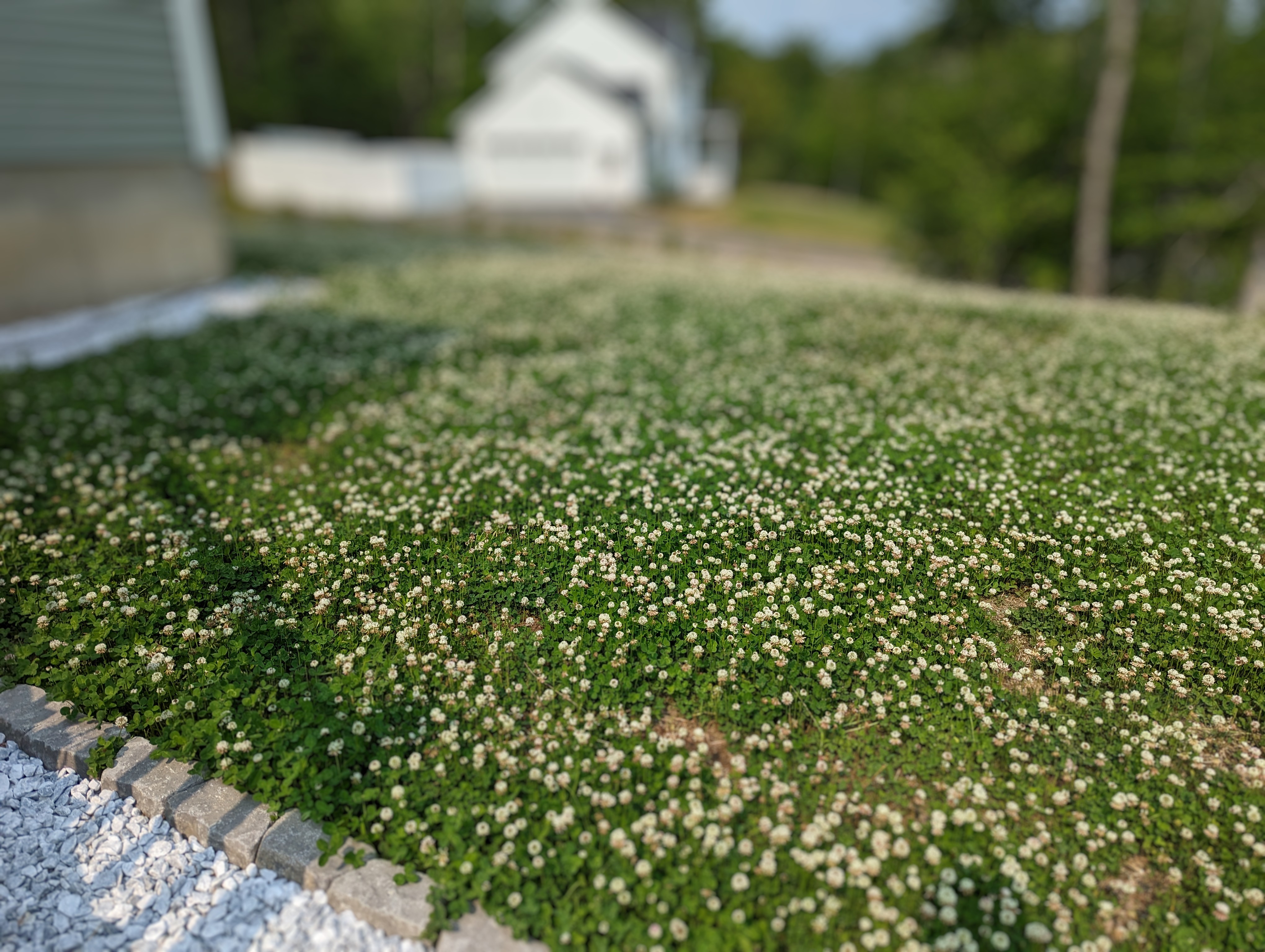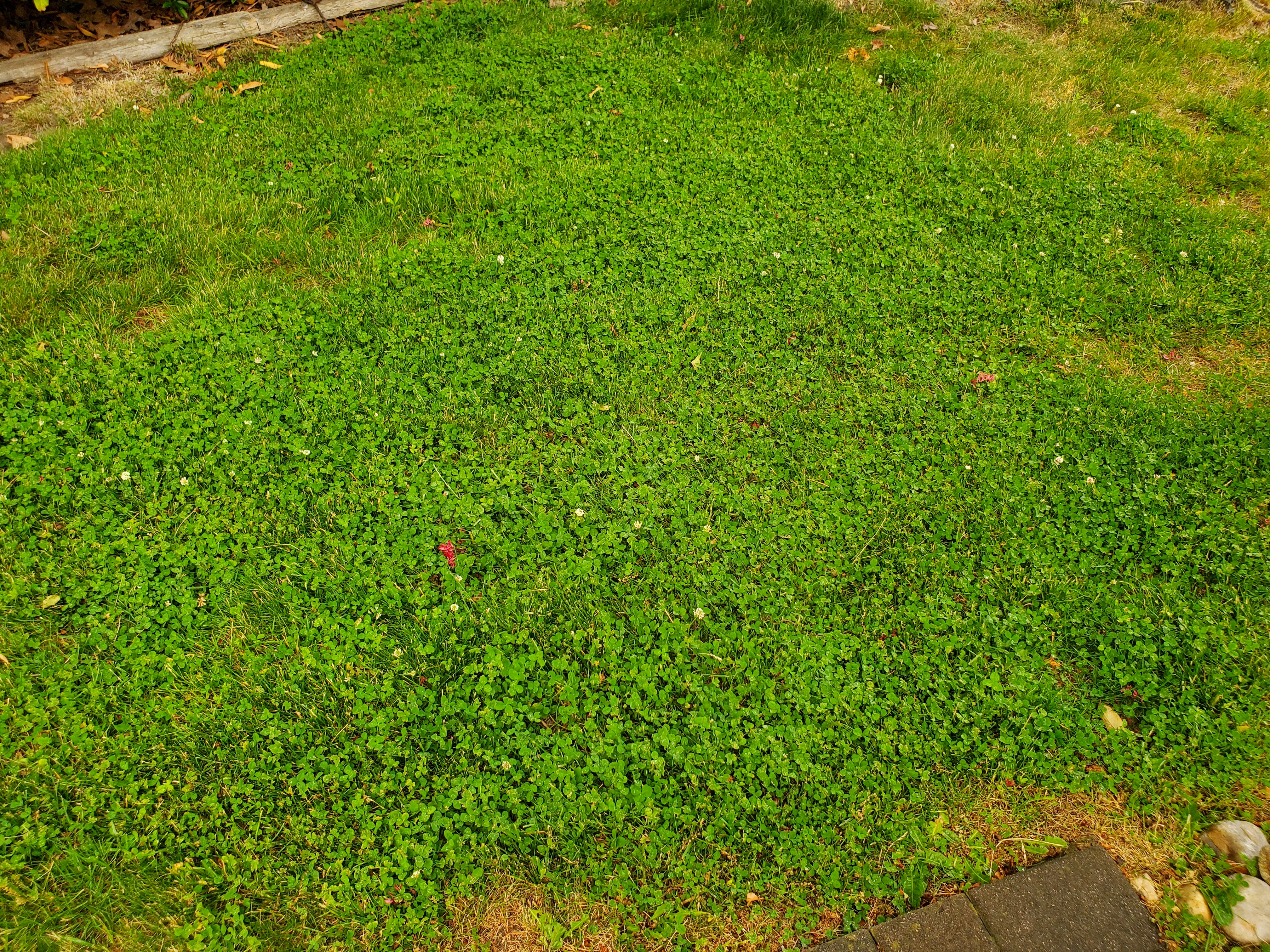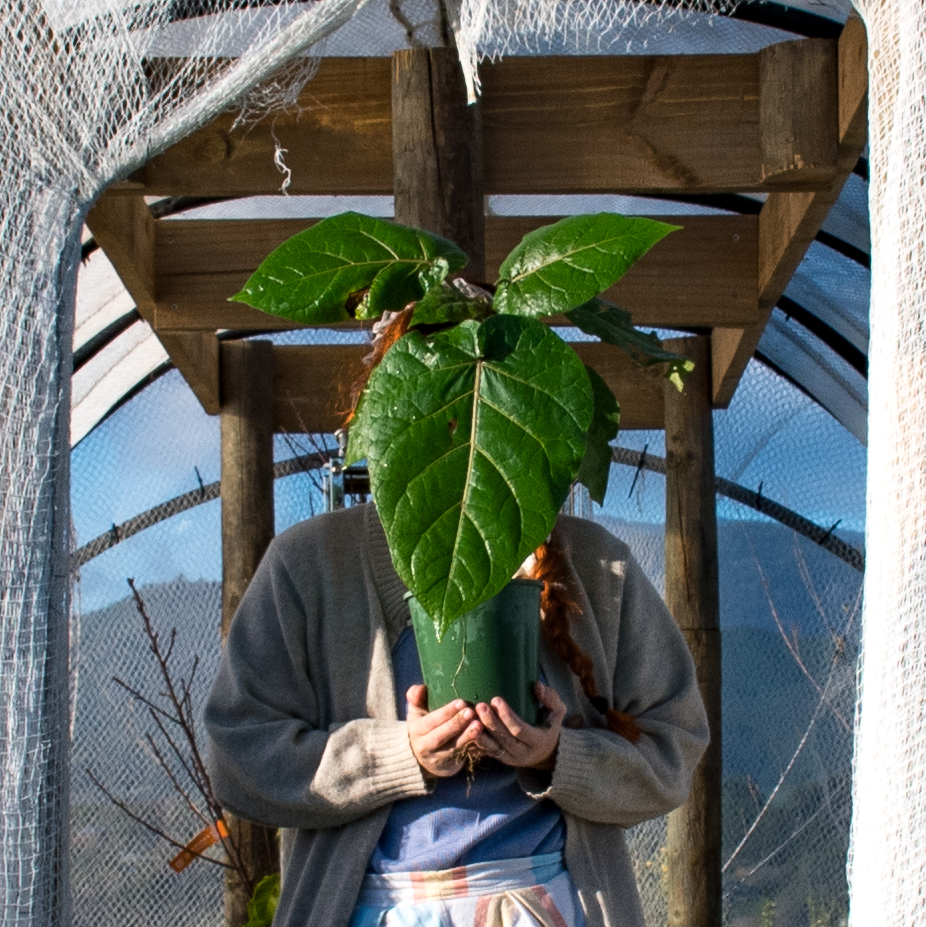I’ve heard they’re better for pollinators, are more drought resistant, and are easier to maintain.
It’s hard to see a downside.
Has anyone here made the change? How’d it go?
I didn’t completely replace grass with clover, but instead seeded clover and let the two commingle. it doesn’t grow as tall as grass, doesn’t leave bare patches, is a nitrogen affixer so the rest of the lawn looks even greener without fertilizer, and it attracts pollinators.
The only catch is that it spreads fast, so if you have a vegetable garden you’ll need to work more to keep it out of there. However it’s much easier to pull too.
Pick a type of clover that is native to your region.
I’m in the same boat. I am adding clover seed when I reseed the lawn and encouraging it as much as I can. Using Dutch White, since the native clovers don’t really work as a lawn alternative. However I am growing a native called Springbank Clover but that’s just for fun- I really like clover. I also have Crimson which I use as a green manure and Red clover which is just pretty and fiils in some gaps in the flower bed. Like I said I like clover. The one people are using as a lawn alternative is ‘mini’ clover. As I understand it it’s a hybrid that hasn’t stabilized itself yet and will revert back to whatever it’s parents were (dutch white probably?). So I haven’t bought that yet. It’s kinda pricey. But ya it does sound great. More drought tolerant, has flowers for pollinators, adds nitrogen. I’d love to see it in practice.
I ripped out all grass in my smallish yard & filled the area with native plants, shrubs & a ground cover plant thing that should help suppress weeds in a few years. Used a lot of mulch to help keep retain water & also assist with weed suppression.
The benefit of using native plants in my country is that they’re usually drought tolerant & adapted to the harsh conditions that we can experience at times.
It was a lot of work & a bit expensive but I see less introduced birds in my yard now & more native birds. More native & introduced bees too. I’ve noticed that introduced bees target the larger flowers. Native bees are smaller, they seem to target smaller if there’s too much competition for introduced bees on the larger flowers.
The best part, I don’t have to mow anymore.
I love my clover yard. When I bought my place, it was hydro seeded. I made sure to sow clover shortly after the grass was sprouted and trying to establish. The first year was pretty tough, but even in the peak of summer when grass was getting baked, clover hung on longer. This year, the clover is amazingly successful. I would absolutely recommend a sea of clover to keep your mowing needs down while promoting diversity and a pretty, deep, green.

I seeded four types of native clover and some native lupines based on the recommendations of a local professor at the university.
They took a little while to start thriving because kids and dogs kept churning up the dirt and mud, but its starting to take hold. Much greener and more widespread, and softer, than the native grass seed I planted at the same time. It seems to be helping the grass to take hold in the same areas too. We had a solid two weeks where we couldn’t walk outside without getting mobbed by butterflies and other pollinators. Its nice to feel like I’m just dumping water onto my lawn for no reason.
10/10 would recommend.
I really like the idea, but I’m worried about the mud issue. We had a big patch of clover, and it seemed like a canopy of clover leaves with mud underneath, so the dog was always tracking it in. Do you think I might have had a different kind of clover? I would really love to do a full clover lawn, but I don’t want a muddy kitchen all the time :/
In our case the mud was because the largest patch we grew on was mostly bare due to how poorly our grass had handled the previous summer and how trafficked it was. I haven’t noticed any issues since the clover grew in, except for areas where it was still immature or had been killed before reaching maturity by the kids and dogs, which I just reseeded a week or so ago.
I have noticed that we have multiple layers based on the different varieties though, with some growing taller and some growing closer to the ground. None of them are flowering yet so I couldn’t say which they are with certainty. I’m mostly going off the different patterning and leaf shapes. Its possible that contributes to producing less mud, I’m not really sure.
I live in an apartment building, so sadly I don’t have the option. But a few houses in my neighborhood have native plant gardens instead of lawns and they’re absolutely beautiful.
Inadvertently, yes. I love it, and highly recommend it.
We sort of had this happen but I think last year I helped it develop a lot more. Last year I mowed around the clover patches and left a number of clover “islands.” The bees of course loved it. This year there is so much clover that the clover island would be most of the backyard. I’m interested in how the clover will do through the summer as the grass has been scorched the last few years.
Once the grass is gone, you’ll have to mow less. That, combined with the idiosyncrasy of the bees gathering cloves, makes everything worth it.
Only downside, besides the neighbors disliking it, is that some times of the year I get tons of clover mites all over my yard and garden.
I’ve read clover can be less durable to foot traffic.
It roots differently too so if you have really rocky ground the creeping roots of pink and white clover will work better
I’ve added clover into some of my lawn. It took an area that was dry, dusty, and worn and has made it lush and green with no other changes to lawncare. The grass in areas with clover added is looking better too.
I used a micro clover I got off Amazon. It took until the next year for the clover to really get going. The first year it was a bit thin.
Oh neat! you should post a pic here we would love to see that! How and when did you lay the seed? and can it tolerate being walked on? Also I’d love to know if you have dogs and if it can stand up to that kind of ‘abuse’?
I scattered it by hand in August. I think I may have used a metal rake to try and score the dirt a bit so it could take hold. I watered for a couple weeks then stopped.

One dog. She likes to run through this particular patch. Along the specific path she runs it took a bit longer to grow but then has held up well.
It’s so pretty! and you can see in the top right corner just how much greener it is than the old patchy grass. Great job! I with I could zoom in but beehaw won’t let me do that (just me?)
It didn’t work well for me in my desert climate (~12" annual precip) until I put down pavers as a walkway. Reducing the water competition and creating some runoff made all the difference. Now they grow like crazy and I don’t even need to water. They do sprawl, so it’s not nearly as “neat” as grass. Lawn addicts and HOA nazis will obviously not approve.
I’ve just put some clover seed down in the dead/grassless areas of my lawn and it’s starting to come up. I also went with white clover because I’m in New England and that species was recommended as best for our climate.
All of our community grass areas in town are a mix of grass and white clover, including the park at the center of town where they hold the farmer’s market and people are always walking and playing. The clover seems to thrive there and isn’t bothered by the foot traffic, mowing, or never being watered.
My reason for trying it was to fill dead areas without wasting a ton of water keeping grass alive.
We have a white clover, pink clover, and sheep sorrel mixed ground cover. It dies back a bit in summer because we don’t irrigate but flushes out again as soon as it rains. The grass dies with the dry periods but the clover just shrinks and drops leaves. I still trim it back to get some green material to rot into soil so it’s not as a “no mow” alternative for me. I love that it’s putting nitrogen into the rocky earth below.
The downside i have found is that it climbs up into garden beds and can smother other low growing plants. Mint has nothing on clover. It will get everywhere. I have had mint for years and it has never left the herb garden. The clover is absolutely everywhere and has even smothered a section of peppermint.
Can I ask where you live? I line in Texas and have thought about replacing our lawn with clover, but seem to find nothing but negative reviews on lawn forums.
Aotearoa/NZ so otherside of the world. I don’t think clover would do well in texas. You should look into creeping thyme. That might be a better alternative as it can handle more heat, drought, and sun plus sandy poor soils
Ive been slowly getting clover to take over in my yard. Theres at least three different kinds growing as well as a bunch of other wildflowers. The grass is mostly dead this year but the good plants are thriving.
I have yet to buy any clover seeds to spread.
I mowed as short as I could and threw a pound of crimson clover seed and a pound of dutch white clover seed among the grass. I watered heavily until it started competing. I didn’t water again and had an effortless mixed clover and grass lawn until I sold that house.
Consider adding dandelions with your clover. They’re pretty and if you harvest the leaves (similar to arugula) and flowers (tea, salad, even wine) they are quite controllable and you save money at the grocery store.
We get a lot of dandelions here anyway so they’d probably end up mingling whether intentional or not - Now I did hear a while ago that all the parts of the dandelion are edible, and that the flowers are delicious fried, but I’m a little afraid of eating things from the lawn because the neighbourhood has a lot of roaming cats and they… use… my garden frequently, which puts me off nibbling on them.
I was thinking of intentionally growing them in a raised planter though.








